(!)NOTE : Windows 7 users won’t be able to use some latest features of eCatalog/WOS since Microsoft is ending support for Windows 7 on 14 Jan, 2020. Please upgrade your system for uninterrupted services.
- Scheduled Maintenance Notice: This site will be unavailable due to scheduled maintenance from 6:30 19/1/2025 to 3:30 (IST) 20/1/2025. We apologize for the inconvenience.
- Notice of End of Sales for Economy Series Pneumatic Equipment Category. More information.
THK Cable Carriers
Search by specifying the lower class category
Brand |
|
|---|---|
| CAD |
|
| Days to Ship |
|
1 items
- Sort By
-
You can add up to 6 items per a category to the compare list.
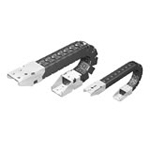
Silveyer Cable Retractable Cover Type KSH-L Model
THK
Uses a non-joint, link-less structure made by continuous insert molding of special nylon.
The link-less structure has no rattle or gaps that can be seen in the links of the joint part, so the noise from the links is small when the cable chain is moving and exhibits quietness when moving at a high speed.
This product can also be used in cleanrooms as dust generation and abrasion is less from the ring because of the link-less structure.
[Features]
· Excellent low noise property.
· Achieved quietness of 39 dBA at the time of 1 m/s operation.
· Low dust generation.
· Because of a link-less structure, less dust is generated and thus the product can also be used in cable-guidance devices in cleanrooms.
· Excellent durability.
· No rattle due to abrasion because there are no parts that wears or slides.
· Easy handling.
· Storing cables and hoses is easy because an opening/closing type cover (except KSL-10) is used.
· Uses parallel joints (parallel mounting brackets) which makes it easy to add silveyers of the same size if additional cables and hoses are required in mechanical structures, etc.Inner Height H1(mm) Inner Width W1(mm) Bending Radius R(mm) Properties Cover Type Type Pitch P(mm) Number of Divided Sections inside Carrier Cable Insertion Type Max. Cable O.D. Dp(Ø) Cable Insertion Surface Operating Speed(m/s) 17 ~ 40 38 ~ 90 30 ~ 110 Low Particle Generation / Low Noise / High Endurance Full Cover Modular Type Square Shape 23 ~ 40 Not Provided Snap (Opened/Closed) 11.9 ~ 28 Outer Circumferential Surface 3 Days to Ship: 12 Day(s) or more  12 Day(s) or more
12 Day(s) or more
| Brand |
|---|
| Product Series |
| CAD |
| From |
| Days to Ship |
| Inner Height H1(mm) |
| Inner Width W1(mm) |
| Bending Radius R(mm) |
| Properties |
| Cover Type |
| Type |
| Pitch P(mm) |
| Number of Divided Sections inside Carrier |
| Cable Insertion Type |
| Max. Cable O.D. Dp(Ø) |
| Cable Insertion Surface |
| Operating Speed(m/s) |
You can add up to 6 items per a category to the compare list. | |
| Brand | THK |
| Product Series | |
| CAD |
|
| From | - |
| Days to Ship | 12 Day(s) or more |
| Inner Height H1(mm) | 17 ~ 40 |
| Inner Width W1(mm) | 38 ~ 90 |
| Bending Radius R(mm) | 30 ~ 110 |
| Properties | Low Particle Generation / Low Noise / High Endurance |
| Cover Type | Full Cover |
| Type | Modular Type Square Shape |
| Pitch P(mm) | 23 ~ 40 |
| Number of Divided Sections inside Carrier | Not Provided |
| Cable Insertion Type | Snap (Opened/Closed) |
| Max. Cable O.D. Dp(Ø) | 11.9 ~ 28 |
| Cable Insertion Surface | Outer Circumferential Surface |
| Operating Speed(m/s) | 3 |
Loading...
Configure
Specification/Dimensions
-
Inner Height H1(mm)
-
Inner Width W1(mm)
-
Bending Radius R(mm)
-
Properties
- Standard
- Low Particle Generation
- Low Noise
- Low Friction
- Low Vibration
- High Endurance
-
Cover Type
-
Standard
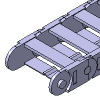
-
Full Cover
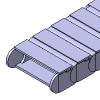
-
One Side Cover
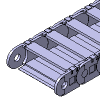
-
Standard
-
Type
-
Square Shape
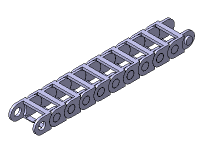
-
Modular Type Square Shape
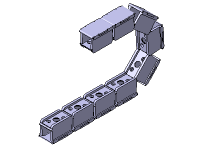
-
Related Components

-
Square Shape
-
Pitch P(mm)
-
Number of Divided Sections inside Carrier
-
Cable Insertion Type
-
Max. Cable O.D. Dp(Ø)
-
Cable Insertion Surface
-
Operating Speed(m/s)
Narrow search by specifying Manufacturer
Related Categories to Cable Carriers
FAQ Cable Carriers
- Question: What are the advantages of using a cable carrier?
- Answer: 1. Cable Organization: Cable carriers help manage and organize cables, preventing tangling, twisting, and damage. Moreover, they also enhance workplace safety.
2. Improved Reliability: By preventing cable damage and wear, cable carriers increase the reliability and uptime of machinery and equipment.
3. Easy Maintenance: Cable carriers simplify maintenance tasks by providing easy access to cables and hoses.
4. Noise Reduction: The enclosed design dampens vibrations and reduces noise levels in a working environment.
5. Customizability: Cable carriers come in various sizes, materials, and configurations, allowing for customization based on specific application requirements of the machine - Question: How do you select the right size and type of cable carrier?
- Answer: 1. Determine cable and hose requirements: For example, how many cables are in the systems, what diameter, bending radius and types of cables and hoses
2. Check the Inner dimensions of the cable: To select the internal application area of the cable carrier We have to consider taking into account the size of the cable. Including having to allow for the distance between the cables as well
3. Consider Load Capacity: Determine the maximum weight of the cables and hoses, including any additional loads such as connectors or fittings.
4. Environmental Factors: Evaluate the operating environment for the cable carrier, such as moisture, clean room and so on. Choose a cable carrier with appropriate material and protection features to withstand these conditions.
5. Evaluate Motion Requirements: Determine the expected range of motion and dynamic behavior of the cables and hoses. Consider factors such as linear or multi-axis movement, speed and acceleration.
6. Mounting Options: Consider the available mounting methods, such as horizontal or vertical mounting, fixed or moving mounts - Question: What are some of the most important factors to consider when designing a cable carrier or drag chain system for electrical conduit protection?
- Answer: 1. Cable and Conduit Size: Ensure that the selected cable carrier has sufficient inner dimensions to accommodate the size of the electrical conduits along with any additional space required for cable movement.
2. Load Capacity: Choose a cable carrier that can handle the anticipated load without sagging or causing excessive strain.
3. Flexibility and Range of Motion: Consider factors such as linear or multi-axis movement, bending radius, and the need for torsional or lateral flexibility.
4. Environmental Conditions: Choose a cable carrier made from materials that can withstand these conditions for example high temperatures , moisture and provide adequate protection.
5. Mounting and Installation: Ensure that it is compatible with your application. Consider ease of installation, accessibility for maintenance
6. Safety and Codes Compliance: Ensure that the cable carrier system complies with relevant safety standards such as fire resistance, electrical insulation etc.
7. Maintenance: Select a cable carrier that allows for easy access and maintenance of cables moreover consider for replacements in the future. - Question: What are the different materials used to make cable carrier?
- Answer: 1. Plastic/Polymers: Cable carriers are commonly manufactured using engineering plastics such as polyamide (nylon), polypropylene, or polyethylene. These materials offer excellent resistance to chemicals, impact, and wear.
2. Steel: Steel cable carriers provide high strength and rigidity. They are often used in heavy-duty applications where there are higher loads, extreme temperatures, or exposure to harsh environments.
3. Aluminum: Aluminum cable carriers offer a balance between strength and weight.. Aluminum is corrosion-resistant and often used in applications that require reduced weight, such as robotics and automation systems.
4. Stainless Steel: Stainless steel cable carriers are highly resistant to corrosion, making them suitable for applications in harsh environments, such as marine or chemical industries. They offer excellent durability, strength, and protection against moisture, chemicals, and temperature extremes.










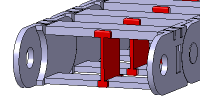
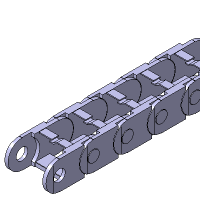
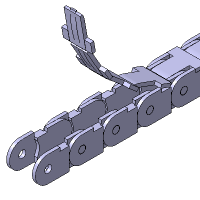

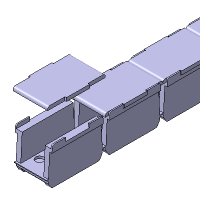
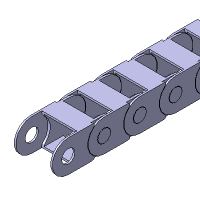



How can we improve?
How can we improve?
Thank you for your time.
Your feedback is essential for our continuous improvement
Privacy Policy
Thank you for your cooperation.
Thank you for your time.
Your feedback is essential for our continuous improvement
Please use the inquiry form.
Privacy Policy